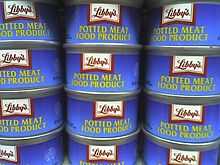Potted meat food product

A potted meat food product is a food, similar to a pâté, made using a method of food preservation, canning, consisting of cooked meat product, seasoned, often puréed, minced, or ground, which is heat processed and sealed into cans. This is different from potted meat, an older noncommercial method of preserving meat.
Various meats, such as beef, pork, chicken, turkey and variety meats are used. It is produced internationally as a source of affordable meat. Its long shelf life and cooked state make it suitable for emergency food supplies, and for military and camping uses, although the high content of fat, and/or preservatives may make it unhealthy for frequent consumption. The final product typically has a spreadable consistency, and typically contains high amounts of salt as a preservative.
Reputation
Canned meats have a mixed reputation on account of the taste, texture, ingredients, preparation and nutrition. The canning process produces a product with a generally homogeneous texture and flavor. The low-cost ingredients used also affect the quality. For example, mechanically separated chicken or turkey is a paste-like product made by forcing crushed bone and tissue through a sieve to separate bone from tissue. In the United States, mechanically separated poultry has been used in poultry products since 1969, after the National Academy of Sciences found it safe for use. On November 3, 1995, the Food Safety and Inspection Service of the U.S. Department of Agriculture published a final rule in the Federal Register (see 60 FR 55962) on mechanically separated poultry, stating that it was safe to use without restrictions.[1] However, it must be labeled as "mechanically separated" chicken or turkey in the ingredient statement. The final rule became effective on November 4, 1996.
Ingredients
- Armour: Mechanically separated chicken, beef tripe, water, salt, and less than 2%: mustard, natural flavor, garlic powder, vinegar, dextrose, sodium erythorbate, and sodium nitrite.
- Hormel: Beef tripe, mechanically separated chicken, beef hearts, partially defatted cooked beef fatty tissue, meat broth, vinegar, salt, flavoring, sugar, and sodium nitrite.
- Libby's: Mechanically separated chicken, pork skin, partially defatted cooked pork fatty tissue, partially defatted cooked beef fatty tissue, vinegar, less than 2% of: salt, spices, sugar, flavorings, sodium erythorbate and sodium nitrite.
See also
References
- ↑ "9 CFR Part 318, et al.; Poultry Products Produced by Mechanical Separation and Products In Which Such Poultry Products Are Used; Final Rule" (PDF). U.S. Department of Agriculture. Retrieved 2007-11-25.